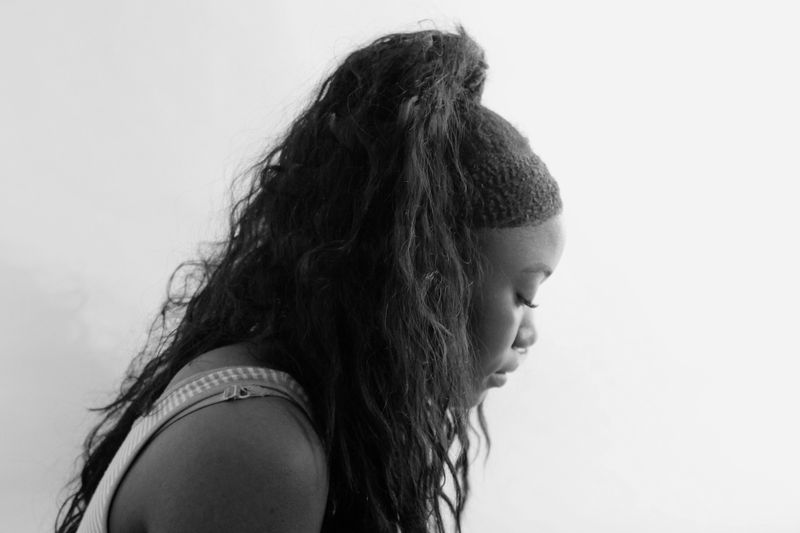We Are America
My Hair
By Flora

Lowell High School, Lowell, Massachusetts
Up until the age of seven, I didn't think about my hair. I lived in Cameroon and everyone wore their hair shaved. Looking back at my time in Cameroon I now recognize that our hair was kept this way because our natural hair was not “presentable” enough for the school board members.
When I was seven, I moved to Virginia. I went from being surrounded by people who looked like me, to being surrounded by predominantly white students with long, straight, silky hair. I stood out with my kinky hair and became embarrassed. I hoped to have hair like the white kids around me. Not long after I moved to Virginia, my family permed my hair with the intention of helping me fit in, I didn't understand why and didn't ask questions.
Still even after perming my hair, I was different from my peers. My hair was short, bushy and maintaining it was time consuming, so when I was eight I decided to wear braids. My peers would compliment my braids, which made me feel accepted. But when I took them off I would hear things like “your hair looks better in braids.” I didn't really process the comments when I was eight, but I made sure to wear braids more often.
When I was nine, we moved to Lynn Massachusetts. Lynn was a lot more diverse, but predominantly Hispanic. Most students around me had big bouncy curls, so I stood out. I wanted my hair to be like my classmates. At the time I still had my braids, but this time students made fun of me for them especially during recess. Other students would call my hair flammable. This frustrated me. They would assume I was bald-headed under my braids and would make jokes about me being bald.
I began to believe that my natural hair was not “presentable”, and that my braids were too fake to wear. I started watching Youtube videos to learn how to create big bouncy curls. I spent money on curl enhancer products that were not for my hair texture. I always ended up being disappointed because my hair texture couldn't hold such curls. The hair jokes got to me so much, that I wanted to be mixed, because mixed girls had the big bouncy curls that our society admired.
In eighth grade we moved to Lowell. Once again my peers made fun of my braids, but this time they called me “Fetty Wap” because my braids were black and gold like the rapper’s dreads. This made me angry.
In Lowell, my mom enrolled me in Girls Inc., an organization that helps girls to be “strong, smart, and bold.” To my surprise the teen coordinator was a brown skinned woman named Maritza. I was shocked to see someone like me. Most adults in my life who weren't family, were white. When my mom cut my hair and I felt really insecure about my looks, Maritza would hype me up and assure me that I was better than my insecurities. Slowly Girls Inc. became my safe place from the hate of other students and of myself. It was the first time I was able to talk to an adult who cared about the little things that affected me, like my hair. She encouraged me to love my kinks, she helped me realize how much representation matters in the eyes of be- ing a black woman in America. I realized how from a young age, I believed my hair wasn’t “neat” enough for society. But I also came to understand that my upbringing towards my hair was degrading and that my kinks are fine just the way they are.
Today it's rare for me to wear my natural hair out in public because its short length limits the hairstyles that would fit my face. Regardless, I'm still work- ing on loving my natural hair, and I hope that one day I'll be able to wear it out proudly, without a second thought that it may not be “neat” enough.
© Flora. All rights reserved. If you are interested in quoting this story, contact the national team and we can put you in touch with the author’s teacher.